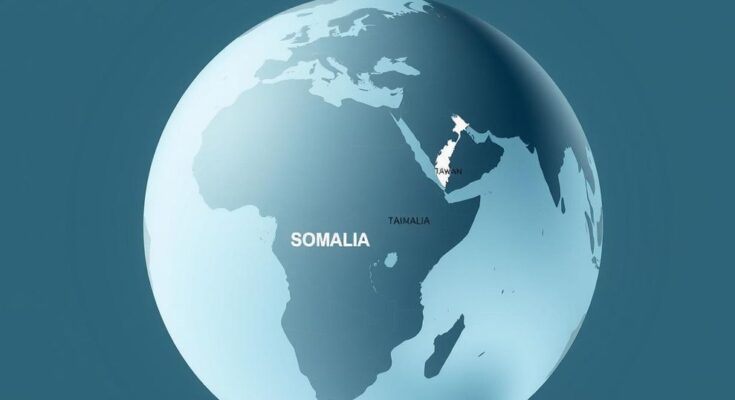Taiwan strongly criticizes Somalia’s new travel restriction on its passport holders, effective April 30, amid rising tensions linked to China’s one China policy. Somalia’s civil aviation authority enacted the ban following Taiwan’s diplomatic engagement with Somaliland. Taiwan urges caution for its nationals considering travel to the region, while neither Somaliland nor Somalia has publicly commented on the situation.
Taiwan has expressed deep discontent following Somalia’s new restriction on Taiwanese travelers, implemented on Wednesday. The ban specifically prohibits individuals with Taiwanese passports from entering or transiting through Somalia, as stated by Taiwan’s foreign ministry. This development follows a directive from the Somali civil aviation authorities issued just days prior, intensifying tensions amidst Taiwan’s growing diplomatic relationship with Somaliland, a self-declared independent region that has yet to gain widespread international recognition.
The action to bar Taiwanese passport holders comes as a reaction to Taiwan’s embassies being established in Somaliland’s capital a few years ago. This move angered both China, which views Taiwan as a breakaway province, as well as the Somali government. The Somali aviation authority’s announcement, detailed in a notice to airlines, explicitly mentioned that Taiwanese passports would not be accepted for entry or transit into Somalia beginning April 30, according to statements from Taiwan’s foreign ministry.
In response, Taiwan’s ministry of foreign affairs expressed strong objections, claiming Somalia acted under China’s instigation to curtail the travel rights and safety of Taiwanese people. They demanded an immediate reversal of the travel restriction. Taiwan’s officials condemned Somalia’s apparent misinterpretation of United Nations Resolution 2758, seeing the travel ban as a connection to the controversial ‘one China’ principle advocated by Beijing.
Taiwan has advised its citizens against any travel plans to either Somalia or Somaliland until the ban is lifted, considering safety concerns. So far, neither Somaliland nor Somalia has publicly addressed this situation. Remarkably, Taiwan maintains its own constitution, conducts multiparty elections, and exercises de facto independence.
Beijing’s stance remains firm, insisting on reclaiming Taiwan as part of its territory, even threatening military action if necessary. Given China’s diplomatic maneuvers, Taiwan’s international recognition has dwindled, with only a small number of countries continuing to acknowledge it.
Particularly noteworthy is Somaliland’s own status; it declared independence from Somalia in 1991 amid political turmoil following the fall of a dictatorial regime. While Somaliland operates largely autonomously and holds regular elections, significant portions of Somalia are under the control of the militant group al-Shabab, which has connections to al-Qaeda. To complicate matters, Somalia has criticized Ethiopia for engaging in a deal with Somaliland concerning the lease of a port, indicating ongoing tensions in the region.
In summary, the recent travel ban against Taiwanese passport holders by Somalia amplifies the long-standing diplomatic tensions surrounding Taiwan’s status in the international arena. This development not only reflects Somali adherence to the one China policy but also highlights the continuing diplomatic initiatives by Taiwan in areas like Somaliland. As the global community watches, the implications of political allegiances and conflicts in this region remain a critical matter to follow.
Original Source: www.bbc.com




